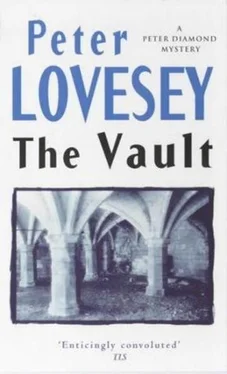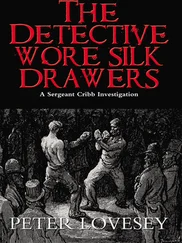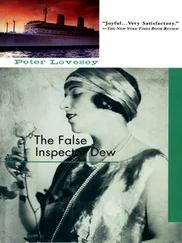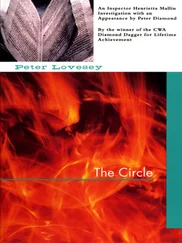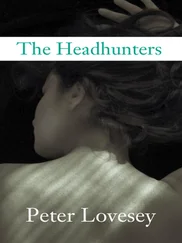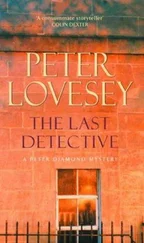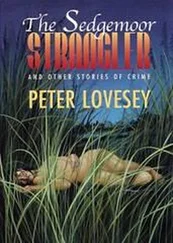"You could have phoned."
"What with? I don't carry one of those ghastly mobiles."
Diamond didn't pursue it. "This way. It's down in the vault."
"Where the hands were found?"
"Yes." He escorted Middleton down to the vault.
"My word," said the pathologist as he shook open the protective overall he was handed, "you've got major earthworks here. Is the skull where you found it?"
"Exactly as it was. We brushed away some of the earth around it, that's all."
"And no doubt brushed away the hairs I'll be hoping to find." He stepped into the overall and zipped it up. "Hair is durable. It often remains after other tissues have decomposed. No, I won't complain. Let me help you with that." He grabbed the back of the garment Diamond was struggling with and hauled it up to shoulder height. "Don't they make an XXL?"
They put on overshoes and walked over to the skull. Diamond said, "The Scene of Crime team say she's female."
"I wouldn't disagree with that." Middleton took a torch from his bag and bent over the skull. "No hair that I can see." He tapped the cranium lightly with his gloved knuckle and stroked its surface with something like affection. Then, against all the rules, he burrowed with his fingers, took a grip and plucked the entire thing from the earth and placed it on the level above. "And where were the hands found?"
"Some distance off. Over there, between two flagstones."
Middleton flicked off some earth, pressed the skull backwards and opened the jaw. "Because, you see, the evidence suggests that the hands and the skull are not related."
He felt himself blush scarlet. "Get away."
"Have you noticed the colour? I know it's difficult under these lights, but I'd call this brownish-yellow. Caramel, shall we say? The hand bones I saw were paler, whitish in colour."
"They were in concrete. They weren't stained by the soil," Diamond pointed out.
"Fair enough. What clinches it for me are the teeth." Middleton worked the jaw again, and for an instant the skull looked animated, seeming to enjoy Diamond's confusion. "Several molars missing, but no dental work. Unusual in a modern adult."
"True."
"Now run your fingers gently over the cranium, like this."
Diamond did as instructed.
Middleton turned to face him, smiling. "I know it's not so obvious through latex, but do you feel the coarseness of the surface texture? I mean you can see the cracks in places. This is deterioration I would expect after many, many years of seasonal changes in temperature. Heat-waves, frosts. And I'm not talking ten or fifteen years, Peter." He bent closer, pressing the torch almost to the bone. "It looks to me as if petrification is well under way, meaning that this little lady is turning into a fossil. She was dead a few centuries before the owner of the hand was born. You don't want me on this job. You want an anthropologist."
A DAY as discouraging as this should have ended with a couple of beers. Instead, he found himself in the Victoria Gallery looking at a carafe of water. He was seated at a long table between the Head of CID Operations, John Wigfull, and a woman with a wheezy chest. It was five to seven and the meeting of the PCCG was shortly to begin.
Diamond casually asked Wigfull, "Have you, em, had an invitation from Georgina?"
"Georgina?"
"Dallymore."
"The new ACC." Wigfull blinked nervously several times. "No. Have you?"
"I expect she's doing it alphabetically," Diamond said. "It's an 'At Home'. Thursday. I suppose I'll turn up."
An extraordinary stillness came over Wigfull.
Diamond said, "I won't have any evenings to myself at this rate."
Eventually Wigfull managed to think of a comeback. "Heard about your skull."
"Oh, yes?"
"Couldn't they estimate the time of death, then?"
"I knew it was old."
"But not prehistoric?"
"Prehistoric, my arse."
"How old is it, then?"
"Medieval, Middleton says."
"Oh-a mere five hundred years or so?"
Diamond turned his back and introduced himself to the wheezing woman. She said she was from Victim Support and he told her she couldn't have chosen a more suitable person to sit beside. She eyed him warily.
The meeting got under way. As the senior policeman present, he was forced to defend the latest crime figures. Violent crime was on the increase, and Councillor Sturr, across the table, wanted an explanation. "I'm a forthright man, Superintendent, and I don't mind telling you these figures are deplorable. We employ you to keep our streets safe, and look at the result. It's getting steadily worse."
Diamond was tempted to give the forthright man a forthright riposte, but this was not the occasion. "If you're worried about the streets, Councillor," he said in as measured a way as he could at the end of a trying day, "you need not be. Most of this increase is domestic violence."
"Is that supposed to be good news?"
"It's my answer to your concern about our streets. They're relatively safe."
"Our homes aren't."
"They never were. Someone in your family is more likely to attack you than a stranger."
"What a world we live in now."
"The figures are rising because people are reporting it more, thanks to the better climate of opinion."
The last phrase was totally misunderstood by one of the delegates, who interrupted to say he was sure Mr Diamond was right about global warming. He had noticed riots always happened on hot summer nights.
The aptly-named Councillor Sturr returned to the attack. The name was familiar; he was a millionaire who had made his money out of stone-cleaning, washing the fronts of old buildings, a profitable business in Bath. He was probably still under forty, slim, in a tailored grey suit, with brown eyes that missed nothing, and dark hair slicked back. He was always in the local press, giving away the prizes at flower shows and school speech days. This combative stuff was another side to the man. "So what are you saying, Mr Diamond? That this increase is down to people attacking each other in the privacy of their own homes?"
"Not entirely, but broadly, it's true."
"Weasel words, Superintendent."
"Yours, sir, or mine?"
Diamond heard Wigfull's sharp intake of breath.
The Councillor bulldozed some more. "Look here, I was brought up in Bath. I know this city as well as anyone sitting around this table, and I tell you it's turned into a dangerous place. What with drugs and beggars and barmy people who ought to be locked up, it's no wonder these figures are so shocking. When I was a boy it was safe for kids to go out to play on a warm evening like this. Now, I think twice about going out myself."
Diamond nodded, as if to confirm the dismal truth. "You're speaking of the nineteen-sixties, I would guess."
"I was born in 1963, the year sexual intercourse began, according to Philip Larkin's silly poem-but my parents didn't think much of Larkin or the so-called sexual freedom and nor did most of the people of Bath. Flower power, hippies, the Beatles and all that nonsense. The revolution came late to Bath. The buildings here were covered in grime in those days, but it was a clean place to live in. Law-abiding and safe."
"Safe?" said Diamond.
He nodded. "I could go out playing on summer evenings and my parents knew I would come to no harm."
"They let you play outside?"
"Yes, indeed. In those days nobody had ever heard of the dreadful things that happen to children now."
"That isn't quite right, Councillor," Diamond said as he marshalled his thoughts. This happened to be a period he knew well from his collection of books on the post-war detectives. "You wouldn't remember a local man called Straffen, who strangled two little girls your own age. Here in Bath in the early fifties, before you were born. And if you weren't aware of him at the time, I'm sure your parents were, and the good people of Bath. He made all the headlines."
Читать дальше
